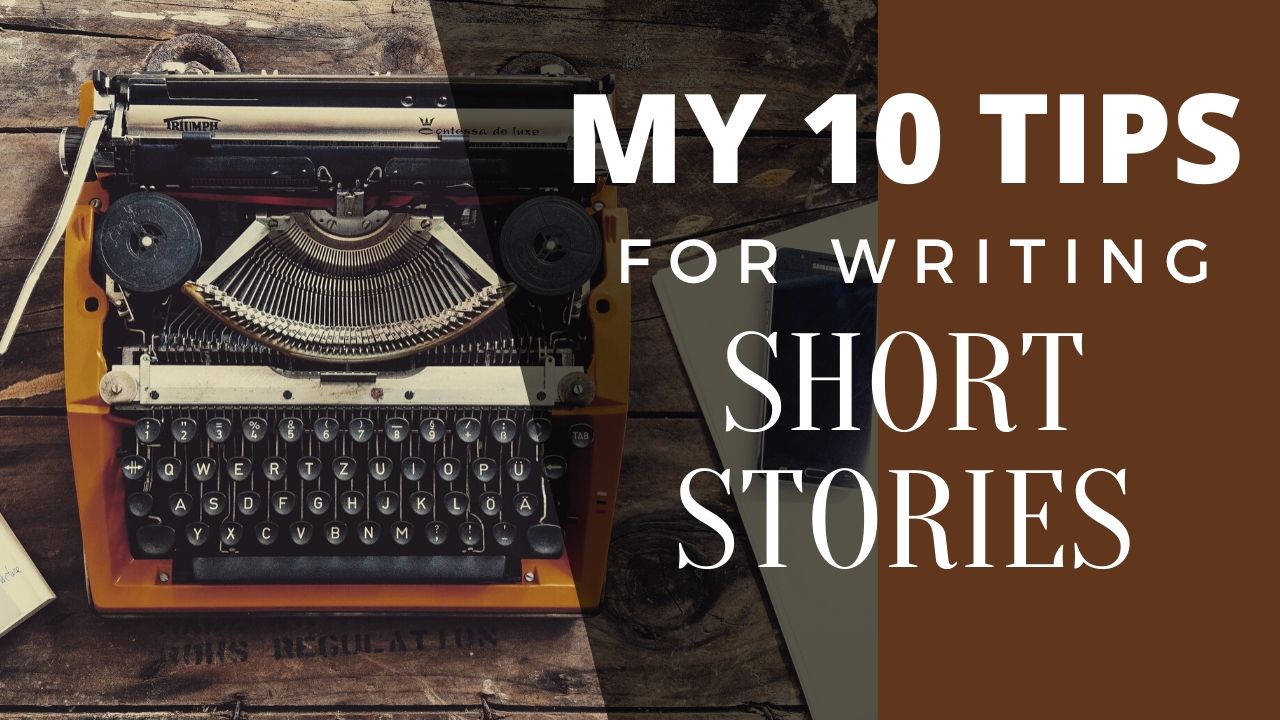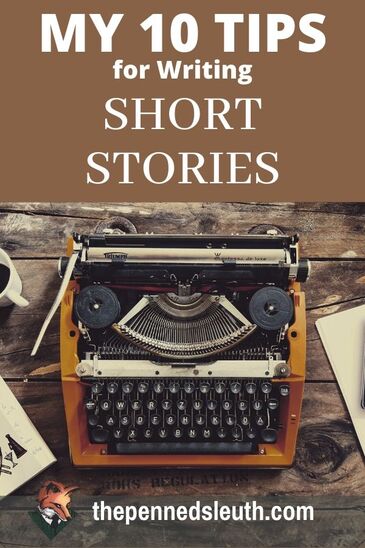Latest Writing Video! |
|
My mentality when it comes to writing is simple. Have an idea, write it down and then expand upon it as much as you can. Sometimes, an idea doesn’t go as far as you believe. For many, this is a novel scrapped, time wasted. For me, if an idea won’t work as a novel, it will surely work as a short story. It’s a great opportunity to write, which we all enjoy and the best part, it can lead to something bigger. Here are my top 10 tips for writing short stories, let’s jump into it! 1. Go With the FlowWhen writing a novel, you need to feel the story the same way an artist feels the subject of a painting. A measure of planning goes into the work, deeper understanding and dash of good intention can lead to something great. However, a short story is similar to that of a doodle. An idea, a small idea that is easy to create as you are thinking about it as you create it. The artist doesn’t have a set plan when creating a doodle, just an idea. Their pencil moves across the paper easily as they develop their image. That is the mindset a writer needs to have when they approach a short story. Simply by sitting down and starting, adding a line here and there as the story rounds out. The very first tip I recommend is to go with the flow. Don’t bog yourself down with even the roughest of plot structures. Write with the same energy as a young child wanting to write their first story. No serious thought goes into it, just an idea and some time to kill. Your story will develop as you write it, probably becoming something you never expected. Yet, by the end of it, you will feel better have approached the story so loosely. Instinct and imagination are a wonderful combination. 2. Word Count to Push/Restrict YourselfWord count is something I always keep at the back of my mind when writing. It’s there, but it isn’t so intrusive on my thoughts that I constantly worry if I have written too much or too little. It’s a vague number that reminds me that this is a short story. It needs to be short, but not so short that you can’t start enjoying it before it is over. A short story is a chapter a novel waiting to happen. It is rare that I ever check the word count and realise I have written too much or too little. I keep the range-wide depending on how long I plan to work with the story. Take for instance, in my first few hundred stories I maintained a low word count of a thousand words. It wasn’t much, but seeing as I was writing a short story every day, it was the perfect goal to keep in mind. It reminded me not to go overboard, as I might fall into the trap of writing the story in the same way I would write a novel. If that ever happens, my readers wouldn’t be able to enjoy it as a short story, instead they would expect the next chapter. Luckily, with such a low word count, I never felt a short story was too short. With a recent series of short stories, I decided to up the word count. Now, working in the range of 1,500 to 2,500 words, I spend 2 days working on a story. Closer now to the length of a chapter, I can now write without the stress of being too wordy. Instead, I can slow the pace down enough for me to create a more satisfying story. 3. You Don’t Need to Have an Ending in MindStory ideas are constantly changing the more you think about them. You have many ideas and some turn out to be better than others. You might find the ending for an idea changes for the better as you write your novel, the same happens when you write a short story. I don’t have an ending in mind. Often, I introduce characters as I feel necessary, create scenes as I feel necessary. I write to subvert expectations on the best of days, as I don’t want to create such a predictable story. Sometimes it can’t be helped and the expected ending is the best ending possible for the short story and its length. Sometimes, the story takes a turn that never crossed my mind. It’s a wonderful feeling when such a phenomenon happens. Your story seems to have a life of its own, something clicks in your mind and you write something you are more than happy with; you write something you are surprised by. Now, that is not to say it is bad to have an ending in mind. Many times have had an ending in mind and it is still a satisfying story, but you can still just as easily write a story with just the idea in mind, not the ending. 4. Use it as an Opportunity to ExperimentIn my first series of short stories, I dabbled with many genres and ideas. Writing styles, in particular, were the most fun to experiment. I tried being more verbose, writing lengthy descriptions on many subject matters from the wonderful to the horrific. When writing a novel, one doesn’t feel such freedom as it is important to maintain consistency throughout your novel. If your writing style changes, it appears to be a loss of interest in the story, which can extend to the reader. You want to maintain your writing style in a novel, but in a series of short stories, you are free to do as you like. I personally recommend that you use short stories as an opportunity to experiment with parts of writing that you haven’t tried before. You might find that you enjoy writing a genre over another, or perhaps develop a new technique in your writing style. It is an opportunity to improve as a writer, so it is best to take advantage of it. 5. Re-Write Your StoriesNot all stories will deserve as much attention. There will be some short stories where you feel it is better to leave it where it is. Yet, the short stories that you enjoy certainly deserve a bit more attention. Most likely, it will be in the form of a re-write. I am not talking about editing the story, adding here and taking away there. I mean a full re-write. With an idea solidified in your mind, some characters established or a loose plot structure constructed, you have a selection of assets at your disposal. A re-write gives you the chance to write a better story, one more interesting or enjoyable. One where you can revel in what you enjoyed about writing it and cut out what you didn’t. If you are sharing your stories, be it on a blog for the whole world to read or with your friends and family, you will no doubt receive a better reception from them. You took the time to take a rough diamond and cut and polish it for everyone to enjoy. For better short stories, this is a tip that should be considered constantly. 6. Don’t Get Caught Up in DialogueDialogue is one of the many parts of writing that I truly enjoy. It’s a great way to get a character’s personality across to the reader without having to write a full bio. Yet, when it comes to a short story and it’s limited word count, it is easy to get carried away. Dialogue is easy to write and even if you are writing a novel, it is a small but necessary part. Most of the writing will be narration in both novels and in short stories. Unless your character’s conversations are the core of the story, you need to keep your dialogue to a minimum. Show your story to the reader through your narration, don’t let dialogue push it out of the spotlight. You can write a brilliant story, with several characters and not have a single line of dialogue. If you are to use it in your story, it has to be essential. If an exchange adds nothing, write it off in narration. 7. A Twist Always HelpsMost short stories will contain a twist of some kind to interested the reader. Throughout my short stories, I have considered adding a twist; some stories more than others. Which lead to twists that even I didn’t see coming. Some stories won’t need a twist, the story being better without one. However, many stories hit harder if you throw in a twist. You can subvert the expectations of the reader by killing off a character they thought would live, or perhaps revealing that one character isn’t who they appear to be. It is fun to read and often fun to write. A twist can be used to deliver a deeper message or add to the atmosphere of a story. 8. Get a Message AcrossOften, an idea comes with a message. It doesn’t have to be a profound message, like an advantage of a certain ideology, it can simply be a feeling you want the reader to feel. For example, if you are writing a scary story, the objective is to scare the reader. The core of your idea could be this simple, so getting that message across is very necessary. Yet, if your idea is more complex, you need to construct a more elaborate story to demonstrate the idea. It can affect your characters, the plot or even the way you write your story. Once you have got the message in hand, you are simply doing your best to explain it in a small word count. A short story without a message is very hard to create as the reader will always take something away from the story. It could be they ignore your core message as they were too busy enjoying your wonderful dialogue of the poetic descriptions. With such a small word count, don’t be afraid to spell it out. 9. The Title Matters, Think On ItThe title is one of the most fun parts of writing a short story. You need something to perfectly capture the theme of your story, its idea and perhaps even the ending. The title requires more time and usually ends up being more specific than vague, unlike most novel titles. In a way, the title will capture the reader the same way a book description will. It is the subtle hint into the small world of your creation. You need to make it interesting enough to attract a reader, but not misleading either. It needs to be a title that captures your story, sums it up in some way. If you plan on sharing your story, a great title is crucial. 10. Try to Write Short Stories RegularlyThe final tip is a simple one. I recommend you write short stories as regularly as possible. I believe that every writer has the time to write a short story now and then. When I first started writing short stories, it started out as a personal challenge to write a short story every day. A difficult challenge, where if I slipped up and missed a day, I pushed myself to write two the next day to catch up. By the end of it, I had written more than I ever had in my life, subtly building up this work ethic that helped my novel writing more than any other practice. Having surprised myself with how far I took that challenge, I realised the wonderful feeling of accomplishment writing a short story gives you. It may not be anywhere near the same feeling as finishing a novel, but it certainly is a boost to one’s confidence and energy seeing visible progress in ones writing. I don’t write a short story every day anymore, but I still make it a habit to write at least one story a week. If you do anything regularly, you are bound to get better at it. In this way, a short story a week will help you in every aspect of writing. ConclusionOn that note, that brings this article to an end. The final point I want to make is that writing anything will help you in the long run. Creating content and pitching it to your readers is the fundamental part of writing as a business. I recommend that if you want to turn your writing into something profitable, to ensure you have more time to do what you love, that you share it with the rest of the world. There are many sites you can create an account for and post your works, but I recommend creating a blog or even a book. Collect these short stories or poems or any written content, edit and improve it and create a book that many of your future fans would love to read. If that doesn’t sound like your cup-of-tea, then simply holding a book of you work, paging through it and seeing how your writing has changed will give you the same satisfying feeling of accomplishment. With that said… Good day, goodnight and happy writing! Thank YouAs a big thank you for reading this article I would like to offer you something for FREE! A writing course on how to improve your main character! Click here to check out your course. If you are unsure about a course, then you can sign up for free training! Claim your free training here! Thank you for reading! Pin for Later!
0 Comments
Leave a Reply. |







